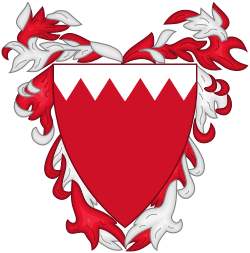Judiciary of Bahrain
The Judiciary of Bahrain is the court system of Bahrain. It is divided into three branches: the Civil Law Courts, the Criminal Law Courts and the Shari'a Law Courts. The Civil Law Courts deal with all commercial, civil, as well disputes related to the personal status of non-Muslims. The Shari’a Law Courts have jurisdiction over all issues related to the personal status of Muslims.[1]
 |
|---|
| This article is part of a series on the politics and government of Bahrain |
|
|
| Judiciary |
|
| Administrative divisions (governorates) |
|
Related topics |
|
|
Judges of the middle and lower courts are nominated by the Bahrain Supreme judicial council and appointed by decree by the king of Bahrain. The Supreme Judicial Council, chaired by the King, appoints the members of the Constitutional Court.[1] To secure renewal of these contracts, judges may be prone to consider it necessary to take decisions not unfavourable to the wishes or interests of the Government.[2]
History
The first regular court in Bahrain was established in 1922. The judiciary was divided into a civil judiciary and a Shariat judiciary.[3]
Court of Cassation
The Court of Cassation was established in 1989 as a supreme court of appeal. It serves as the final court of appeal for all civil, commercial, and criminal matters.[1] The judges for the court are appointed and removed by royal decree.[4] The current Chief Justice of Bahrain and president of the Court of Cassation is Khalifa bin Rashid Al Khalifa, a cousin of King Hamad and the prime minister, and a member of the Al Khalifa ruling family of Bahrain.[5]
National Safety Court
The National Safety Court (Arabic: محكمة السلامة الوطنية) is a special military court that was set up in March 2011 to try protesters, opposition leaders, rights activists, and people who supported or are perceived as supporting the Bahraini uprising.[6] A military judge presides over the court, along with two civilian judges, all of them appointed by the Bahrain Defence Force commander-in-chief, Marshal Khalifa bin Ahmed Al Khalifa,[6] a cousin of King Hamad and the prime minister, and a member of the Al Khalifa royal family. The cases are prosecuted by the military public prosecutor Colonel Yousef Rashid Flaifel.[7]
The National Safety Court has been heavily criticized by international human rights organizations for trying civilians in a military court and for the lack of transparency and due process. Human Rights Watch has described the court as a "travesty of justice",[8] while Amnesty International has described it as a "sham"[9] and "a parody of justice."[10]
In June 2011, King Hamad announced that all trials related to the protests would be transferred from the National Safety Court to the normal civilian courts. However he backtracked on August 18 issuing a decree which makes it clear that the new measures do not apply to all arrested protesters.[10]
See also
References
- "Country Theme: Judiciary: Bahrain". UNDP-Programme on Governance in the Arab Region. Archived from the original on 2012-03-07. Retrieved 2011-10-02.
- "Attacks on Justice 2002 - Bahrain" (PDF). International Commission of Jurists. 22 August 2003. Archived from the original (PDF) on 3 April 2012.
- History of the Judiciary
- "Legislative Decree No. 8 of 1989 with Respect to Promulgating the Cassation Court Law". Official Gazette of the Kingdom of Bahrain. 20 April 1989. Archived from the original on 5 August 2012.
- "The Court of Cassation Postpone Appeal". Bahrain News Agency. 26 September 2011.
- "Bahrain's Human Rights Crisis". Human Rights Watch. 5 July 2011.
- "Bahrain court sentences protester to death, gives doctors who treated demonstrators jail time". The Washington Post. Associated Press. 29 September 2011.
- "Bahrain: Stop Military Court Travesty of Justice". Human Rights Watch. 14 June 2011.
- "Bahrain Protester Convictions Upheld at Sham Military Trial". Amnesty International. 28 September 2011.
- "Bahrain Must Not Try Activists in Military Court". Amnesty International. 22 August 2011.
Further reading
- Radhi, Hassan Ali (2003). Judiciary and Arbitration in Bahrain: A Historical and Analytical Study. BRILL. ISBN 978-90-411-2217-9.